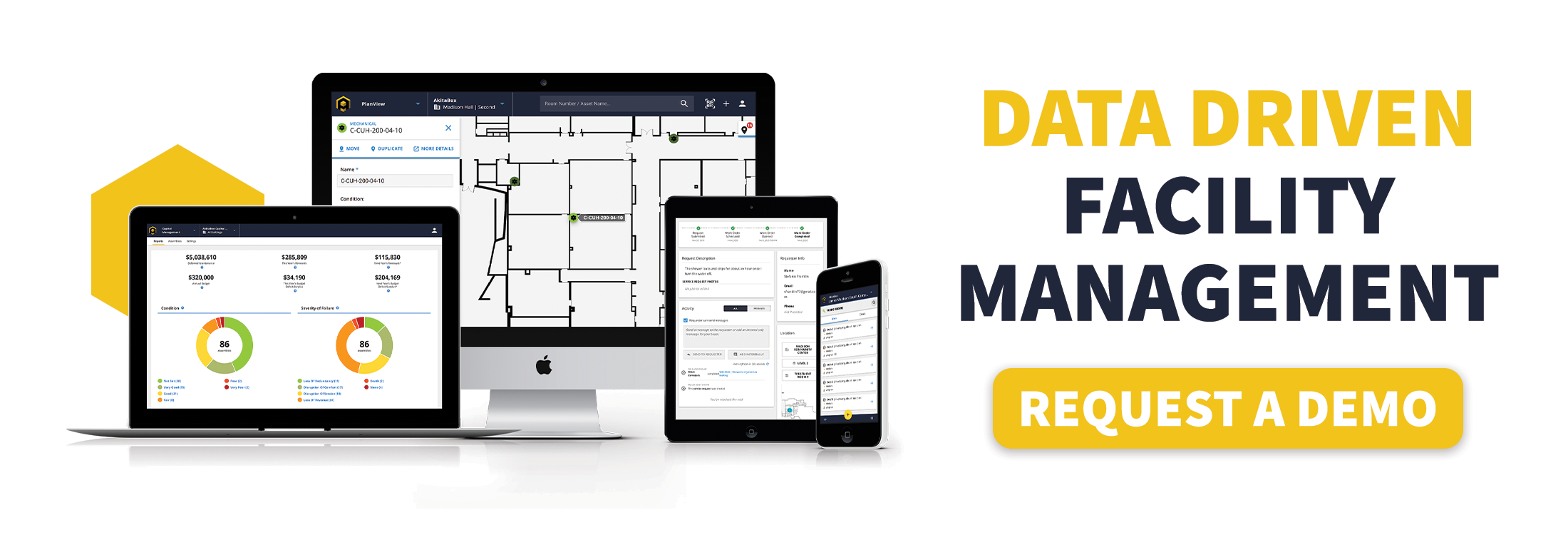When you’re busy running from one reactive maintenance request to another during times of high occupancy, it’s hard to carve out time for larger, more strategic initiatives. With fewer people in the building (whether because of summer break, a holiday break, hybrid work options, or something else), now’s your chance.
Here are 5 areas to focus on while you have your buildings (mostly) to yourself during low occupancy periods.
Comprehensive Facility Audit / Asset Inventory
Knowing what you have, where it is, and what condition it’s in is the essential baseline data you need to be successful in facilities management.
- Confirm all of your assets’ locations and conditions.
- Update your floor plans.
- If your FM software allows it, map your assets onto digital floor plans within your software.
- Audit specific systems such as energy, technology, lighting, HVAC, etc.
With AkitaBox Capture, you can leverage the power of AI to quickly and accurately collect the data you need.
- Bring in an AEC partner to do a “living” facility condition assessment.

Testing and Tweaking of Emergency Preparedness/Response Plans
During an actual emergency is NOT the best time to find out your evacuation routes are outdated or that no one knows where the water shutoff valve is.
- Ensure all of your fire-life-safety assets are in good working order (fire extinguishers, AEDs, exit signs, evacuation route placards, etc.).
AkitaBox Inspections software makes it easy to schedule inspection rounds, identify areas of noncompliance, and schedule remediation.
- Confirm your staff knows where key shutoffs are located.
Some FM software like AkitaBox allows you to show asset relationships on your digital floor plans so it’s easy to see the upstream and downstream relationships between key equipment.
- Update your floor plans and asset maps so they are ready to be shared with emergency personnel.
- Conduct drills or simulations for various emergency scenarios, such as flooding, burst pipe, fire, tornado/hurricane, active shooter, etc.
- Ensure your emergency response plans are current.
- Train your staff on any new emergency procedures and technologies.

Comprehensive Building Inspection
Whether your goal is to examine specific issues like safety hazards or more general concerns such as structural integrity or code compliance, consider carving out time during a low occupancy period for thorough inspections.
- Take advantage of advanced inspection tools like drones, thermal imaging cameras, and 3D laser scanning. Contracting with an outside partner is one way to get access to those types of technology.
- Use appropriate digital tools to collect and store your inspection data systematically. Add photo or video documentation where needed.
With AkitaBox, you can input inspection findings while in the field, review the results, and incorporate the findings into your upcoming maintenance schedules or capital planning.
- Create action plans to address critical issues depending on the severity or importance of the issue. Simple or small issues may only require a work order. Larger or more complex concerns may need budget approval, specialty contractors, and a project schedule.

Deep Cleaning and Disinfection
Wherever people gather, germs (and dirt) aren’t far behind. This is the time to get into the nooks and crannies and do more intensive cleaning and disinfectant treatments that aren’t feasible when lots of people are in a space.
- Identify areas that need attention, including high-traffic and high-touch spaces, surfaces with buildup that haven’t been cleaned in a while, etc.
- Determine what equipment and supplies will be needed: disinfectants, cleaning agents, vacuums, scrubbers, pressure washers, etc.
- Create a cleaning schedule.
You can create work orders for cleaning tasks and keep track of your team’s progress using AkitaBox software.
- Ensure your staff has all necessary PPE and ventilation.
- Provide training on cleaning techniques and safety protocols if needed.

Training and Professional Development
Giving your team opportunities to keep learning and enhance their skills can improve the efficiency, safety, and sustainability of your facilities.
- Identify the training needs of your team. Conducting a skills assessment can help you discover any knowledge gaps.
- Invite industry experts and experienced professionals to lead training sessions. And don’t forget to ask your internal experts to share their best practices and institutional knowledge.
- Encourage your staff to pursue appropriate professional certifications (such as Certified Facility Manager) and provide support for exam prep.
- Recognize and reward staff for their commitment to professional development. Celebrate achievements such as certifications, completed training programs, and successful projects.
- Pair your more experienced staff with newer team members to serve as mentors.
Whether you want to update your asset inventory, streamline your inspection process, become the proud owner of an always-current facility condition assessment, or ensure your organization is prepared for the next disaster, AkitaBox makes a great partner.
